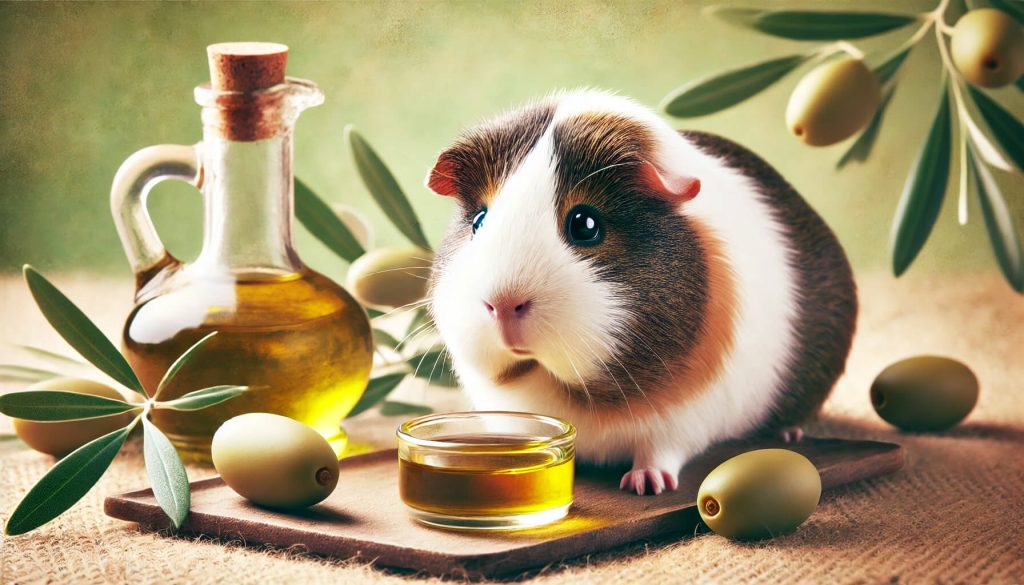
Can Guinea Pigs Eat Olive Oil?
Overview of Guinea Pig Diet
Understanding the guinea pig diet is important for their health. Choosing the right foods ensures a balanced and nutritious diet for these pets.
Importance of Selecting the Right Foods
Guinea pigs require specific nutrients for optimal health. High fiber content is essential to aid in digestion and prevent gastrointestinal issues. Calcium intake must be regulated to avoid bladder stones. Vitamin C is crucial to prevent scurvy since guinea pigs cannot synthesize it themselves. Including a variety of safe vegetables enriches their diet with necessary vitamins and minerals.
- High Fiber Foods: Include hay and leafy greens like romaine lettuce.
- Calcium-Rich Foods: Feed in moderation parsley and kale.
- Vitamin C Sources: Offer bell peppers and oranges sparingly.
Common Foods for Guinea Pigs
Guinea pigs thrive on a diet that mimics their natural herbivorous habits. Their primary food sources include hay, fresh vegetables, and specially formulated pellets.
- Hay: Timothy hay is indispensable, providing essential fiber.
- Fresh Vegetables: Carrots, cucumbers, and bell peppers are excellent choices.
- Pellets: Select ones fortified with Vitamin C and avoid those with added seeds or dried fruits.
Avoid feeding processed foods, sugary snacks, and certain vegetables like iceberg lettuce, which have low nutritional value. These guidelines help maintain the health and longevity of your guinea pigs.
Can Guinea Pigs Eat Olive Oil?
Guinea pigs’ diets require careful consideration to ensure they remain healthy. Olive oil might seem like a beneficial addition due to its popularity among humans. However, it’s crucial to examine its suitability for guinea pigs.
Nutritional Content of Olive Oil
Olive oil contains primarily fats and lacks essential nutrients required by guinea pigs. Rich in monounsaturated fats, it may benefit human heart health, but guinea pigs don’t need these fats. Their diet should be high in fiber, low in fats, and rich in Vitamin C. Vital components like fresh vegetables, hay, and fortified pellets provide the necessary nutrients and support their digestive and immune systems effectively.
Risks Associated With Olive Oil in Guinea Pigs’ Diet
Feeding olive oil to guinea pigs introduces risks to their overall well-being. High-fat content can lead to obesity, heart issues, and liver complications, all detrimental to their health. Guinea pigs’ digestive systems aren’t designed to process significant amounts of fat, which makes olive oil unsuitable. Avoid adding olive oil to their diet to prevent potential negative impacts on their health. Stick to foods specifically formulated for guinea pigs to ensure their diet supports their health needs effectively.
Alternatives to Olive Oil for Guinea Pigs
Guinea pigs can’t safely ingest olive oil. Instead, consider these alternatives to keep your pets healthy.
Safe Fats and Oils for Guinea Pigs
High-fat diets aren’t suitable for guinea pigs, so minimize their fat intake. If you seek oils, flaxseed oil and coconut oil can be used sparingly and only in specific health-related cases. For example, flaxseed oil is rich in Omega-3 fatty acids, promoting healthy skin and coat. Use only a few drops, and consult a veterinarian for proper dosage.
Healthy Treat Alternatives
Fresh veggies and fruits are excellent treats. Carrots, bell peppers, and cucumbers provide essential nutrients and are low in fat. Offer fruits like apples, blueberries, and strawberries in moderation due to their sugar content. Hay-based treats formulated for guinea pigs offer both nutrition and enrichment. Choose high-quality brands to ensure the best ingredients for your pet.
How to Introduce New Foods to Guinea Pigs
When adding new foods to your guinea pig’s diet, make changes gradually to prevent digestive issues and ensure your pet’s well-being.
Monitoring Health and Dietary Reactions
Start by observing your guinea pig’s behavior and stool consistency after introducing new foods. Offer small portions initially, about a teaspoon, and watch for any adverse reactions like diarrhea, bloating, or lethargy. If you notice any of these symptoms, discontinue the new food and consult a veterinarian. Remember, guinea pigs have sensitive digestive systems that need consistent monitoring when introducing dietary changes.
Use a systematic approach to introduce each new food. Offer one new item at a time and wait 24-48 hours before adding another. This method helps you pinpoint any specific foods causing issues. Stick to guinea pig-friendly options like bell peppers, cucumbers, and leafy greens to keep their diet varied and nutritious.
Gradual Introduction
Gradually integrate small amounts of the new food into your guinea pig’s regular diet over a week. Increase the quantity slowly, from one teaspoon per day to a full serving if there are no adverse effects. This helps your pet’s digestive system adjust without causing stress or discomfort. Ensure the new food is fresh, clean, and free from pesticides.
Keeping Track of Foods
Maintain a food diary to track what new items you introduce and your guinea pig’s reactions. Note any allergies or preferences to avoid putting unnecessary stress on your pet’s diet. Documenting this information helps you make more informed choices about your guinea pig’s food options.
Consulting a Veterinarian
Always consult a veterinarian before adding unfamiliar foods to your guinea pig’s diet. A vet can provide tailored advice based on your guinea pig’s specific health needs and ensure you avoid potentially harmful foods. Regular check-ups also help monitor your guinea pig’s overall health and ensure their nutritional needs are met effectively.
Conclusion
Feeding your guinea pig a balanced diet is crucial for their health and well-being. While olive oil isn’t suitable due to its high fat content, there are safer alternatives like flaxseed and coconut oil for specific health needs. Always introduce new foods gradually and monitor for any adverse reactions. Fresh vegetables, fruits, and hay-based treats are excellent choices to keep your guinea pig happy and healthy. Consistency and careful monitoring are key, and consulting a veterinarian can provide personalized advice tailored to your guinea pig’s needs.
